
Brunei, officially Brunei Darussalam, is a country in Southeast Asia, situated on the northern coast of the island of Borneo. Apart from its coastline on the South China Sea, it is completely surrounded by the Malaysian state of Sarawak, with its territory bifurcated by the Sarawak district of Limbang. Brunei is the only sovereign state entirely on Borneo; the remainder of the island is divided between its multi-landmass neighbours of Malaysia and Indonesia. As of 2023, the country had a population of 455,858, of whom approximately 180,000 resided in the capital and largest city of Bandar Seri Begawan. Its official language is Malay and Islam is the state religion of the country, although other religions are nominally tolerated. The government of Brunei is a constitutional absolute monarchy ruled by the Sultan, and it implements a fusion of English common law and jurisprudence inspired by Islam, including sharia.
Districts are the principal administrative divisions of Brunei. The country is divided into four districts, namely Brunei-Muara, Belait, Tutong and Temburong. Temburong is an exclave; it is physically separated from the three other districts by the Brunei Bay and Malaysian state of Sarawak. Each district has a town as its administrative and main economic centre, with the exception of Brunei-Muara, where the principal centre is Bandar Seri Begawan, a city and the country's capital.
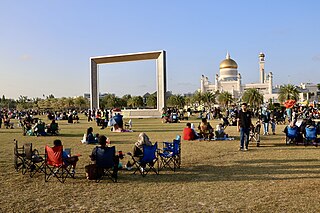
Brunei–Muara District or simply known as Brunei–Muara, is the smallest as well as the most populated district in Brunei. It has an area of 571 square kilometres (220 sq mi) and the population of 318,530 as of 2021. The district is also home to its administrative centre is Bandar Seri Begawan, as well as the Brunei International Airport and Muara Port, the country's only international airport and deep-water port respectively. The Brunei River flows within this district and is home to Kampong Ayer. As the administrative center of Brunei is located in the district, it remains the most developed in the country with the most up-to-date infrastructure, despite not being the center of Brunei's main economic activity.

Tutong District or simply known as Tutong, is the third largest and populated district in Brunei. It has an area of 1,166 square kilometres (450 sq mi) and the population of 47,210 as of 2021. The district is also home to its administrative centre is Tutong Town, as well as the Tutong River and Tasek Merimbun, the country's second longest river and the only ASEAN Heritage Parks in Brunei respectively.

Temburong District or simply known as Temburong, is the second largest and least populated district in Brunei. It has an area of 1,306 square kilometres (504 sq mi) and the population of 9,444 as of 2021. The district is also home to its administrative centre, Bangar Town, as well as the Temburong River and Ulu Temburong National Park, the country's third longest river and a national park in Brunei respectively.

Mukim Kota Batu is a mukim in Brunei-Muara District, Brunei. The population was 12,935 in 2016. The mukim is home to some of the country's museums and historical sites, in particular in Kota Batu.

Mukim Lumapas is a mukim in Brunei-Muara District, Brunei. It has an area of 62.10 square kilometres (23.98 sq mi); the population was 7,756 in 2016.

Mukim Pengkalan Batu is a mukim in Brunei-Muara District, Brunei. The population was 14,492 in 2016.
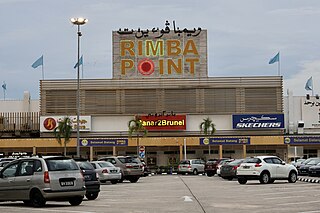
Mukim Gadong 'A' is a mukim in Brunei-Muara District, Brunei. The population was 34,049 in 2016.
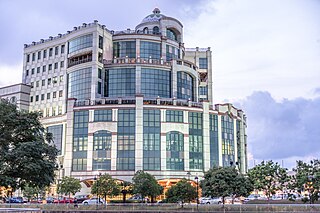
Mukim Gadong 'B' is a mukim in Brunei-Muara District. Brunei. The population was 33,637 in 2016.
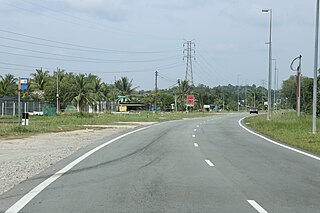
Mukim Keriam is a mukim in Tutong District, Brunei. The population was 9,707 in 2016.

Mukim Kiudang is a mukim in Tutong District, Brunei. The population was 5,924 in 2016.
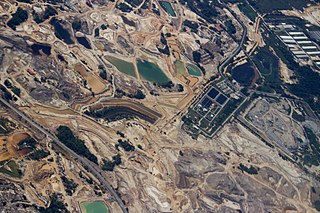
Mukim Telisai is a mukim in Tutong District, Brunei. The population was 10,095 in 2016.

Mukim Pekan Tutong is a mukim in Tutong District, Brunei. The population was 9,883 in 2021. It encompasses Pekan Tutong, the district's sole town and administrative centre.
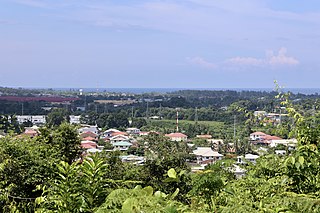
Mukim Liang is a mukim in Belait District, Brunei. The population was 14,301 in 2016.

The Royal Brunei Police Force, RBPF (Malay: Polis Diraja Brunei is in charge of keeping law and order in Brunei. The RBPF has been one of the 190 members of INTERPOL, an intergovernmental organisation worldwide since 1984.
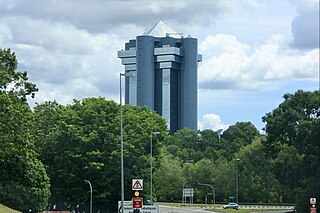
The Ministry of Finance and Economy is a cabinet-level ministry in the government of Brunei which is responsible for the monetary, fiscal and economic policies and development in the country. It was established immediately upon Brunei's independence on 1 January 1984. It is currently led by a minister in which the incumbent is Hassanal Bolkiah, the Sultan of Brunei, as well as a second minister and two deputy ministers.

The Istana Darussalam is the former residence of Omar Ali Saifuddien III and birthplace of Sultan of Brunei, Hassanal Bolkiah. The palace is located at Jalan Darussalam, Sumbiling Lama, Brunei-Muara District, Brunei. The building has become a tourist attraction and currently under the protection of the Antiquities and Treasure Trove Act of the Museums Department.

Kampong Melabau is a neighbourhood in Brunei–Muara District, Brunei, as well as the capital Bandar Seri Begawan. The population was 288 in 2016. It is one of the villages within Mukim Kianggeh. The postcode is BA2511.

The Serasa Ferry Terminal, also known as Serasa Muara Terminal and Serasa Terminal, is a passenger terminal operated by the Department of Immigration and National Registration in Mukim Serasa, Brunei-Muara District, Brunei. It is one of the two ferry terminals in Brunei, which is located in Kuala Belait Port and Serasa.





















